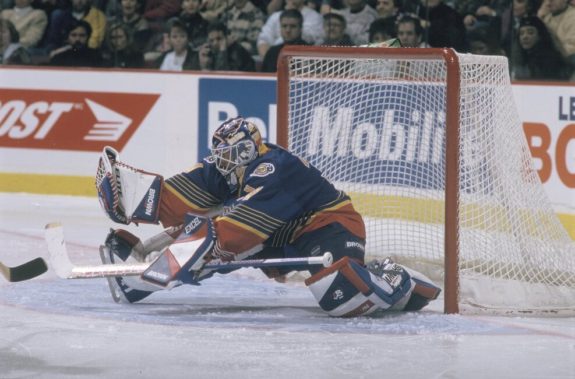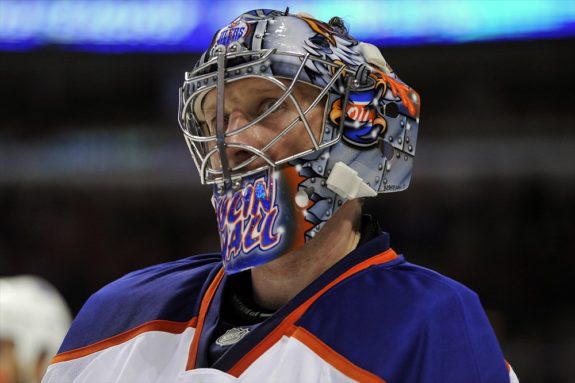Every team in professional sports has, at one point or another, made a player personnel decision that has come back to bite them. Whether it’s giving up on a prospect too early, trading a star player and getting nothing of value in return, or allowing a key player to leave via free agency for financial reasons, these occurrences are commonplace.
For the Arizona Coyotes, they’ve seen more than their fair share of these painful transactions since moving to the Valley of the Sun in 1996. In the first of what will be a multi-part series here at The Hockey Writers, we will take a look back at a player who got away – goaltender Nikolai Khabibulin.
The Bulin Wall
The first starting goaltender in franchise history also likely presents the biggest question of what might have been when it comes to Coyotes’ goaltenders.
When the Winnipeg Jets relocated to Arizona and became the Phoenix Coyotes for the 1996-97 season, Nikolai Khabibulin was already established as the club’s starting netminder. After two relatively average seasons in 1994-95 and 1995-96, “the Bulin Wall” really came into his own during the Coyotes’ inaugural season in the desert. He started 72 games that year, recording a 30-33-6 record to go with a 2.83 GAA and .908 SV%. He led the Coyotes to a playoff berth, where they took on the Teemu Selanne-led Mighty Ducks of Anaheim in the first round.
After the Ducks took the first two games of the series, Khabibulin elevated his game, allowing just three goals over the next three games, all of which were won by Phoenix. The ‘Yotes then lost Game 6 in an overtime heartbreaker, then were shut out in Game 7 at the Arrowhead Pond of Anaheim and were eliminated.
The Coyotes were a playoff team once again in 1997-98, but they reached the postseason in spite of Khabibulin’s play, not because of it. He started 70 games in the regular season, but saw his save percentage drop off to .900. In Phoenix’s first-round matchup against the Detroit Red Wings, who were in the middle of winning a second consecutive Stanley Cup, Khabibulin’s struggles continued. He allowed 13 goals on 106 shots (a .877 SV%) in the team’s first four playoff games and was benched in favor of backup Jimmy Waite, who took over and lost Games 5 and 6 to give Phoenix its second first-round exit in as many years since relocating to the Grand Canyon State.
After the rough conclusion to his 1997-98 season, Khabibulin was back with a vengeance in 1998-99. He posted a then-franchise record save percentage of .923 and set a team record that has yet to be surpassed with his 2.13 GAA. His eight shutouts are also still a franchise record – it has since been tied by Ilya Bryzgalov in 2009-10 and Mike Smith in 2011-12, but no one has had more in a season.
It was an incredible year, one in which Khabibulin led the franchise to their first 90-point campaign since 1984-85. In the postseason, the fourth-seeded Coyotes met the fifth-seeded St. Louis Blues in what was, on paper, a very even matchup.
Through four games, the Coyotes managed to build up 3-1 series lead thanks to a balanced offensive attack as well as solid goaltending from Khabibulin. Things started going downhill in Game 5, though. Phoenix couldn’t solve Blues goaltender Grant Fuhr on home ice, losing 2-1 in overtime, and the series went back to St. Louis for Game 6. Khabibulin wasn’t at his best that night – the ‘Yotes built up a 3-2 lead in the second period, but they could not hold it, as St. Louis scored three times over the final 23 minutes to force Game 7 with a 5-3 victory.

Back at Phoenix’s America West Arena, the fans saw a classic goaltending duel play out on the ice – Fuhr and Khabibulin both pitched shutouts through 60 minutes, and the game headed to sudden-death overtime. Unfortunately for Phoenix, the Blues were able to complete the series comeback in the extra frame, as Pierre Turgeon scored his second of the playoffs at 17:59 to send the Coyotes to their third straight first-round elimination.
End of an Era in Phoenix
Despite the loss, it looked like the Coyotes were in good shape for the future, as Khabibulin had emerged as a legitimate franchise goaltender through his record-breaking regular season and equally impressive postseason performance. However, there was only one problem – money. Khabibulin had just finished a contract that paid him $1.25 million annually, and rejected Phoenix’s offer of a three-year contract with a $3 million average annual value (AAV).
Khabibulin’s agent Jay Grossman countered with a five-year, $20 million contract, which the Coyotes in turn rejected. As a result, Khabibulin began a holdout that signaled the beginning of the end of his tenure in Phoenix. He played with the Long Beach Ice Dogs of the International Hockey League in 1999-00, then continued his holdout into the 2000-01 season.
The worsening situation finally came to an end on March 5, 2001, when the team agreed to trade Khabibulin’s rights and defenseman Stanislav Neckar to the Tampa Bay Lightning for forward Mike Johnson, defenseman Paul Mara, prospect Ruslan Zainullin, and a second-round pick.
Khabibulin and the Lightning were able to agree to terms on a contract, and he resumed his splendid play in goal, posting save percentages of .920, .911, and .910 during his first three full seasons in Tampa.
Then came the 2004 Stanley Cup playoffs. In Tampa’s opening-round matchup against the Islanders, Khabibulin shut out the Isles in three of the first four games of the series before the Lightning closed the door in Game 5 with a 3-2 overtime victory. In Round No. 2 against the Montreal Canadiens, it was more of the same – the Lightning swept all four games with Khabibulin posting a Game 1 shutout while allowing only five goals in the series. Entering Tampa’s Eastern Conference Final matchup against the Philadelphia Flyers, the goaltender was on a hot streak of allowing just nine goals in nine games.
He kept this alive with a 2-1 win in Game 1, but things went downhill over the next five games as he surrendered 15 goals and lost three of the five contests to set up a decisive Game 7 on Tampa’s home ice. Two nights after he was lit up for five goals in Game 6, Khabibulin bounced back – he was staked to an early 1-0 lead on a Ruslan Fedotenko power-play goal and shut down the Flyers the rest of the way en route to a 2-1 victory, which clinched the Eastern Conference title for the Lightning.
Khabibulin Lifts the Cup
In the 2004 Stanley Cup Final, the Lightning faced off against the Calgary Flames and immediately found themselves in a 2-1 series deficit – Khabibulin struggled to a .857 SV% in the series’ first three games, and Tampa lost two of them. He bounced back, though, posting a 29-save shutout in Game 4 before losing a tough 4-3 overtime contest in Game 5 to put Tampa on the brink of elimination.
With his team backed up against a wall in Game 6 at the Saddledome, Khabibulin stood tall, earning a double-overtime win after allowing just two goals in 80:33 of hockey. If you ask a Flames fan, they’ll tell you that Khabibulin also allowed a third-period go-ahead goal to Calgary’s Martin Gelinas on the night, but, officially, the puck never crossed the line, and Martin St. Louis’ goal 33 seconds into the second overtime period sent the series back to Tampa tied at three games apiece.
In Game 7, Khabibulin would not be denied – he again was staked to a first-period lead on another Fedotenko power-play goal, and again allowed just a single goal in a do-or-die situation as Tampa raised the Stanley Cup following a 2-1 triumph.
Khabibulin and the Lightning never were able to build upon that 2004 Stanley Cup championship, though – the 2004-05 lockout wiped out an entire season, and Khabibulin spent the next nine years with the Chicago Blackhawks and Edmonton Oilers before retiring after the 2013-14 season at age 42.

When the Coyotes lost Khabibulin, they were primed to be a Western Conference contender for years, with a young franchise goaltender and a solid core group of players. Their inability to sign Khabibulin effectively ended those hopes, though – the team made two more playoff appearances in the next three seasons following his departure, but won just a single playoff game during each of those postseasons, then entered a downward spiral that lasted until Dave Tippett took over in 2009-10.
Could the Coyotes have won a Stanley Cup with Khabibulin manning the pipes, instead of the Lightning? Could they have extended their playoff contention window by a few more years if they managed to hang onto their goalie? Would they still have traded captain Keith Tkachuk to the St. Louis Blues in 2001 if they were a contender with Khabibulin in net? We’ll never know, but Coyotes fans will always wonder, what could have been?